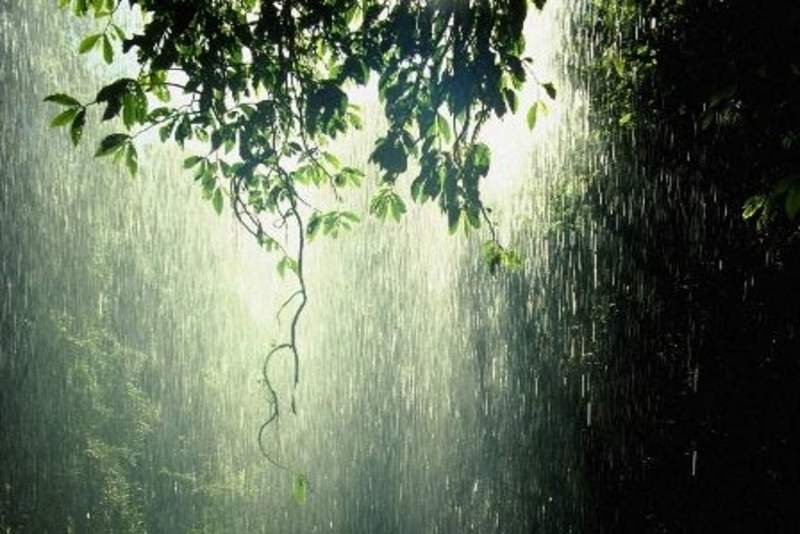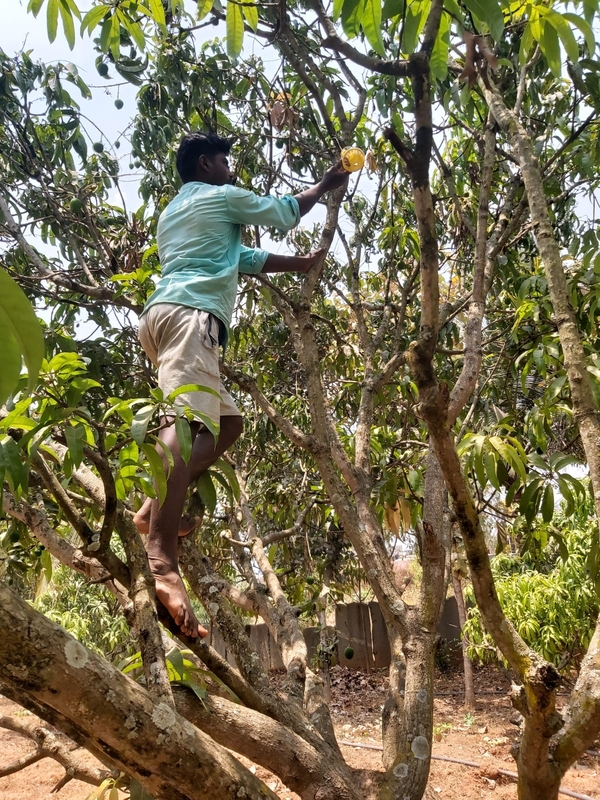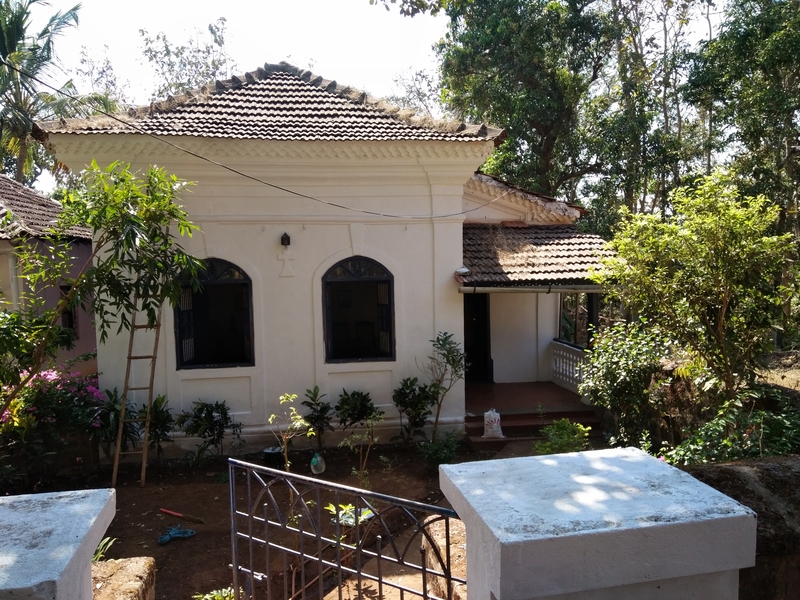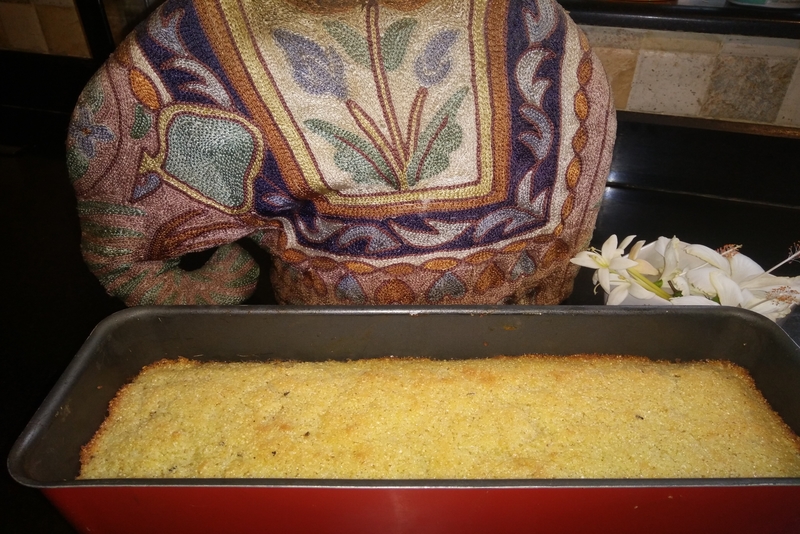Smelling the rain can be therapeutic in Bangalore

It’s February and really not the time for any sort of rain in Bangalore. Yet suddenly, one evening, there was a small burst of rain drops signalling their presence, with a pitter patter on the dusty mango leaves and the coconut fronds, just beyond the balcony. Was it really raining I wondered and ran to the back balcony to see large drops making wet splotches on the leaves and then go dripping down onto the lawns below. Oh just a strange drizzle I thought, going back to watch “ A Winter’s Tale’ on Romedy. Colin Farrell and Russell Crowe were riveting and just a little drizzle was not going to distract me from the film.
But the smell of the wet earth grew stronger and the rain drops grew thicker and turned into a heavier down- pour. The smell of the earth slurping up the falling rain, like a big brown sponge, emitting that wonderful perfume that the first rain does on parched mother earth.
What was that word I thought, puzzling as I watched the rain come down, faster and heavier, wetting the cobble- stones in the path as I looked down. The smell of wet earth? Ah Yes! Petrichor -- THAT was the word. What I am referring to is the earthy scent that emanates when rains falls on dry soil.
Well ofcourse, I needed to know more about the phenomenon. I was interested in knowing with a little more specificity what exactly I meant when I write, “the scent of petrichor.” So my trusty faithful google came to my rescue. While many scents in everyday life are composed of complex mixtures of molecules, sometimes there is one particular molecule that is responsible for most of the characterization of a scent.
Apparently in the case of bananas, for example, it’s something called amyl acetate. One cannot miss the unmistakable scent of ripening bananas. Fills the kitchen when we buy a bunch and they begin to ripen faster than we can eat. In the case of petrichor, it’s something called geosmin. Geosmin is produced in soil by bacteria and is mostly responsible, for what we smell after a rain- storm.
Thunder began to rumble and crash with spectacular lightning bolts flashing across the skies. I thought of my sister’s tenant who has come away from Denmark for the first time and how he was holding up with nature’s fireworks, in this part of the world. “ Never seen so much rain,” he said, “ we don’t get rain like this and all the accompanying noise in Denmark!” he said grinning as he hoisted his back- pack on his way out, for his two hour gym workout.
“ Drains infront all clogged Madam, with flowers from the mango tree,” called the security at the front gate and I asked if he could try and remove some to let the water flow. Lazy answer - it’s going don’t worry, we can manage till the maali comes tomorrow.” So the next day the maali cleared a bucket of flowers which had filled the drain and caused the rain water to back up.
All the plants enjoyed the battering rain and next morning, everything looked fresh and washed in the garden. My Philodendron’s massive leaves looked cleaned of the dust which had settled over the months on my balcony. And as we left for early morning service, the air was filled with the acrid smell of the fallen mango flowers. That smell has not changed since the time I was a child. This year it seems heightened, because the tree is loaded with flowers, unlike other years with just a few odd bunches.
Petrichor, a strange word for a simple, earthy perfume, which no perfumer has been as yet been able to capture and bottle.
But the smell of the wet earth grew stronger and the rain drops grew thicker and turned into a heavier down- pour. The smell of the earth slurping up the falling rain, like a big brown sponge, emitting that wonderful perfume that the first rain does on parched mother earth.
What was that word I thought, puzzling as I watched the rain come down, faster and heavier, wetting the cobble- stones in the path as I looked down. The smell of wet earth? Ah Yes! Petrichor -- THAT was the word. What I am referring to is the earthy scent that emanates when rains falls on dry soil.
Well ofcourse, I needed to know more about the phenomenon. I was interested in knowing with a little more specificity what exactly I meant when I write, “the scent of petrichor.” So my trusty faithful google came to my rescue. While many scents in everyday life are composed of complex mixtures of molecules, sometimes there is one particular molecule that is responsible for most of the characterization of a scent.
Apparently in the case of bananas, for example, it’s something called amyl acetate. One cannot miss the unmistakable scent of ripening bananas. Fills the kitchen when we buy a bunch and they begin to ripen faster than we can eat. In the case of petrichor, it’s something called geosmin. Geosmin is produced in soil by bacteria and is mostly responsible, for what we smell after a rain- storm.
Thunder began to rumble and crash with spectacular lightning bolts flashing across the skies. I thought of my sister’s tenant who has come away from Denmark for the first time and how he was holding up with nature’s fireworks, in this part of the world. “ Never seen so much rain,” he said, “ we don’t get rain like this and all the accompanying noise in Denmark!” he said grinning as he hoisted his back- pack on his way out, for his two hour gym workout.
“ Drains infront all clogged Madam, with flowers from the mango tree,” called the security at the front gate and I asked if he could try and remove some to let the water flow. Lazy answer - it’s going don’t worry, we can manage till the maali comes tomorrow.” So the next day the maali cleared a bucket of flowers which had filled the drain and caused the rain water to back up.
All the plants enjoyed the battering rain and next morning, everything looked fresh and washed in the garden. My Philodendron’s massive leaves looked cleaned of the dust which had settled over the months on my balcony. And as we left for early morning service, the air was filled with the acrid smell of the fallen mango flowers. That smell has not changed since the time I was a child. This year it seems heightened, because the tree is loaded with flowers, unlike other years with just a few odd bunches.
Petrichor, a strange word for a simple, earthy perfume, which no perfumer has been as yet been able to capture and bottle.

Related Articles
Editor's Picks Articles
Top Ten Articles
Previous Features
Site Map
Content copyright © 2023 by Marianne de Nazareth. All rights reserved.
This content was written by Marianne de Nazareth. If you wish to use this content in any manner, you need written permission. Contact Marianne de Nazareth for details.





 -resizeimage.jpg.jpg)

